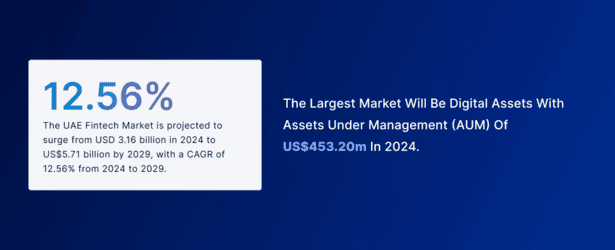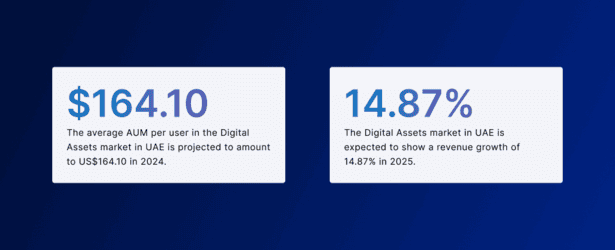How Regulatory Changes are Reshaping the Fintech Landscape in the GCC Region?
8 Apr 24 


Ever wondered about the future of banking and finance in the Middle East?
Picture this: by 2025, fintech companies in the region are expected to multiply their revenue almost threefold, from $1.5 billion in 2022 to a staggering $3.5 billion to $4.5 billion. This transformation is reshaping how we handle money matters in the Middle East.
This growth is primarily fueled by the escalating adoption of digital financial products, especially among the region’s tech-savvy younger population. The COVID-19 pandemic has further accelerated the shift towards non-cash payments, with the United Arab Emirates experiencing a significant rise from 39 percent in 2018 to 73 percent in 2023.
Despite these advancements, only 17 percent of Middle Eastern consumers utilise digital banking, a stark contrast to the nearly 60 percent in the United States. However, the fintech sector’s revenues are anticipated to double by 2025, indicating substantial growth potential.

The prevalent stringent regulatory requirements are a challenge to financial innovation. However, regulators recognize fintech’s potential to achieve greater financial inclusion and boost economic growth. This has led to creating a favourable regulatory ecosystem.. Moreover, recent regulatory changes have had profound effects on both fintech startups and established players in the region.
Eager to explore more about these fintech regulations and its impact on the Middle East, especially on UAE and Oman. Let’s uncover all the exciting details together.
Regulatory Changes on Fintech Industry
Fintech regulations are like the rules for fintech companies, which use technology to offer financial services and products. Fintech is growing fast and changing how traditional banks work. But it also brings new risks like keeping data safe, protecting consumers, and ensuring financial stability. To address these concerns, regulators worldwide are creating better rules to encourage innovation while ensuring people are secure and the economic system stays strong.
The rules for fintech are complicated and constantly changing. Different countries have different ways of making these rules. Some are very involved, while others are more hands-off. Some countries have made special platforms, called sandboxes, where fintech companies can test novel ideas without following all the rules. Others have created fresh laws to control specific parts of fintech, like online lending, payment systems, and digital money.
When it comes to preventing money laundering in fintech, regulators are getting more serious about making sure fintech companies have strong anti-money laundering (AML) measures. Because fintech companies handle a lot of money and sensitive information, they need strict AML processes to stop illegal activities. These processes include checking customers, watching transactions, and reporting anything suspicious. Regulators want to find the right balance between letting fintech grow and keeping the financial system safe through good AML rules.
Also read: Know These 9 Steps Before Developing A Fintech App
The UAE has a proactive regulatory framework to support the fintech sector, driven by the Central Bank of the UAE (CBUAE), the Securities and Commodities Authority (SCA), and the Virtual Assets Regulatory Authority (VARA). The country’s two financial free zones, the Abu Dhabi Global Market (ADGM) and the Dubai International Financial Centre (DIFC), are pivotal in stimulating fintech innovation.
Specific Regulatory Developments
Crypto and Blockchain Regulation
Regulatory bodies like the DFSA, VARA, and FSRA are embracing crypto and blockchain. The DFSA has made positive amendments to its regulatory framework for crypto tokens, permitting staking and foreign funds investments. VARA has started issuing operational licences to virtual asset players, and the FSRA is attracting blockchain infrastructure players.
European Union Influence
The UAE’s fintech sector is expected to be influenced by the regulatory changes in the European crypto assets and broader fintech markets due to the application of the Markets in Crypto-Assets Regulation (MiCA) and the revised Transfer of Funds Regulation (TFR) in the EU.
Operational Resilience
The UK’s Financial Conduct Authority (FCA) has introduced an operational resilience regime. The joint consultation by the FCA, PRA, and BoE on operational resilience and critical third parties (CTPs) is expected to impact the UK financial sector, which could have a ripple effect on the global fintech industry, including the UAE.
Fintech Regulatory framework
The increase in demand for digital services has created opportunities for fintech start-ups and traditional market players entering the fintech space. Notably, virtual and crypto-assets, payments, and open banking have emerged as pivotal components of the UAE’s dynamic fintech ecosystem, presenting opportunities for major global players and driving the growth of local fintechs.
Regulatory Initiatives
Initiatives by the DIFC and ADGM:
The Dubai International Financial Centre (DIFC) and the Abu Dhabi Global Market (ADGM) have been instrumental in propelling the growth of the UAE’s fintech space. Both have set up fintech hubs – the ADGM Regulation Lab (ADGM RegLab) and the DIFC Innovation Hub – to accelerate the growth of fintechs across various sectors, from open banking and payment services to regtech, insurtech, and wealthtech.
These hubs provide fintechs with access to an extensive network of investors, bespoke regulatory frameworks, and regulatory sandbox schemes, showcasing the commitment of the UAE’s regulatory authorities to position the country as a leader in virtual assets and related services.
Regulatory Sandbox:
The Central Bank of the UAE (CBUAE) established a regulatory sandbox in the onshore UAE for the insurance sector and signed memoranda of understanding with the ADGM and DIFC to introduce a co-sandbox program to permit fintechs to test innovative solutions under the existing sandbox program. The ADGM offers the ADGM RegLab, providing a controlled environment for fintech participants to test and develop innovative solutions.
Regulatory Authorities:
In the UAE, regulatory authorities such as the CBUAE, SCA, VARA, FSRA, and DFSA are crucial in administering financial services frameworks and regulating the fintech market. Each authority regulates various aspects of the financial and Fintech sectors within the UAE and its free zone.
Fintech Regulatory Frameworks in Oman
The Central Bank of Oman (CBO) has been actively prioritising the development of Fintech and enhancing innovation in the financial sector. The CBO has introduced suitable regulatory frameworks and approaches, including the Fintech Regulatory Sandbox project and other initiatives in the pipeline. The Fintech Regulatory Sandbox aims to facilitate the development of a dynamic digital financial ecosystem that fosters financial development, provides sustainable support to competitive and diversified economic sectors in the Sultanate, and encourages innovation.
Furthermore, the CBO has drafted a comprehensive strategy to support the development of a thriving fintech ecosystem based on financial technology (Fintech) products and services, aiming to drive competition and diversification in Oman’s banking and financial services industry. The CBO Executive President, Tahir bin Salim al Amri, has highlighted the prioritisation of investments in data management to effectively leverage the full potential of data, contributing significantly to fostering fintech-enabled financial inclusion and enhancing the efficiency of various payment systems.
The CBO has also signed a memorandum of understanding with the Oman Environmental Services Holding Company for cooperation and exchange of expertise in the field of sustainability and the circular economy, with a focus on green finance and investments in environmental, social, and governance fields (ESGs) to support fintech-focused SMEs and other related matters in the circular economy.
Overall, the CBO’s efforts and initiatives reflect a strong commitment to fostering a supportive and innovative fintech regulatory framework in Oman, aligning with the country’s Vision 2040 and aiming to contribute to economic growth, job creation, and attracting venture capital investment.
Emerging trends in Fintech Regulations in Middle East
1. Financial Inclusion and Digital Adoption
The Middle East has seen a surge in non-cash payments, especially during the COVID-19 pandemic. The United Arab Emirates experienced a significant rise from 39 percent in 2018 to 73 percent in 2023. Despite this, only 17 percent of Middle Eastern consumers use digital banking, compared to nearly 60 percent in the United States.

2. Regulatory Challenges
The region faces significant challenges due to a traditional approach of treating the financial sector as sacred ground, often favouring established banking institutions and incumbents.
3. Government-Led Innovation
In the Middle East, numerous countries are aiming to establish themselves as fintech hubs, with significant government interest in promoting financial innovation, albeit with a more government-driven approach rather than industry-driven.
4. Venture Funding and Investor Pool
The region has seen an increase in venture funding for fintech, but an expanded pool of investors, both local and international, is needed to sustain the growth and transformation of fintech startups.
5.Talent Development
There is a pressing need to address the shortage of skilled professionals in the fintech sector. The region must focus on nurturing domestic talent, improving the current workforce, and attracting talented expatriate professionals.
6.Access to Capital and Liquidity
The GCC region’s prosperity has not translated into sufficient venture capital funding, highlighting the need for easier access to capital and increased venture capital funding.
7.Global Competitiveness
The Middle East and North Africa region is steadily building its fintech sector, with a growing number of successful IPOs and significant funds being channelled to dynamic small companies.
Impact of Regulatory Changes on the Fintech Industry in the GCC Region
The evolving rules for fintech companies in the Gulf Cooperation Council (GCC) region have made it harder for both new and existing fintech firms to follow the regulations. This means startups need to spend a lot of resources to ensure compliance. which is especially tough for smaller companies.
Even though these latest rules have made things more difficult, they’ve also helped make fintech companies more trustworthy. Strict adherence to regulations help cultivate trust with customers and protect against online threats by following these rules and keeping customer information safe.
Following these ever-changing rules has made it more expensive for fintech companies to run their businesses, especially when it comes to keeping customer information safe. However, these changes have also created opportunities for traditional banks to work with fintech firms. This collaboration aims to improve services and enhance the overall customer experience, which benefits the financial industry.
Despite the challenges associated with the latest regulations, they have also sparked and improved ideas within fintech companies. Fledgling fintech companies want rules that help them develop innovative ideas and protect customers, which is important for the long-term growth of the fintech industry.
Challenges and Opportunities for Fintech Regulations
| Challenges | Opportunities |
|---|---|
| Regulatory Uncertainty | Clear Regulatory Guidelines |
| Risk Management | Enhanced Consumer Protection |
| Consumer Protection | Risk-Based Regulatory Frameworks |
| Compliance Burden | Innovation-Friendly Regulation |
| Innovation Impediments | Harmonisation of Regulations |
Challenges
1. Regulatory Uncertainty
- Fintech companies, unsure about the rules may find it hard to plan for their businesses
- Following a lot of rules can be tough for beginners , and it can cost them a lot of money to follow all the rules
- Working in different countries means understanding and following rules from all those places
2. Consumer Protection
- Fintech businesses must ensure they treat their customers fairly and follow laws that protect customers from unfair lending practices.
- New companies may find it hard to plan and follow all the rules.
3. Risk Management
- Fintech companies take on more risks, and this can be a problem for regulators who need to make sure everything is safe for customers and investors.
- Regulators must proactively ensure all the rules are followed and that customers and investors are protected.
4. Compliance Burden
- The burden of compliance may be exhaustive for a fledgling fintech company.
- Keeping track of ever-changing regulations impedes day-to-day business operations.
5. Innovation Impediments
- Strict rules may stop new ideas from coming up, but if there are places where companies can test innovative ideas, it can help everyone.
- Getting everybody on board can be cumbersome, but stringent adherence is an imperative to ensure a fair and safe ecosystem.
Opportunities
1. Clear Regulatory Guidelines
- Having clear rules can help fintech companies know what to expect and can help them come up with new ideas.
2. Enhanced Consumer Protection
- Making rules to protect customers’ information and keep them safe can help people trust fintech companies more.
- If customers know more about what they’re getting into, it can help them make better choices.
3. Risk-Based Regulatory Frameworks
- Having risk detection and mitigation measures in place is a good defence against cyber-attacks, phishing, data breaches, identity theft, etc.
4. Innovation-Friendly Regulation
- Making rules that work with sophisticated technologies like blockchain and AI can foster greater innovation in fintech.
5. Harmonisation of Regulations
- If rules are the same in different places, it can help companies work across borders and grow more easily.
Conclusion
In conclusion, the regulatory changes in the Gulf Cooperation Council (GCC) region have significantly influenced the fintech industry. While these changes have caused some challenges like ambiguity regarding the rules, and adherence, they have also paved the path for more efficient and secure fintech innovation. As the rules keep changing, it’s imperative that all stakeholders work together to ensure compliance, with the common vision of making GCC a haven for fintech innovation.

- Android Development3
- Artificial Intelligence27
- Classified App3
- Custom App Development2
- Digital Transformation11
- Doctor Appointment Booking App13
- Dropshipping1
- Ecommerce Apps38
- Education Apps2
- Fintech-Apps35
- Fitness App2
- Flutter3
- Flutter Apps19
- Food Delivery App5
- Grocery App Development1
- Grocery Apps3
- Health Care7
- IoT2
- Loyalty Programs9
- Matrimony Apps1
- Microsoft1
- Mobile App Maintenance2
- Mobile Apps120
- Product Engineering5
- Progressive Web Apps1
- Saas Application2
- Shopify7
- Software Development1
- Taxi Booking Apps7
- Truck Booking App5
- UI UX Design8
- Uncategorized4
- Web App Development1



















Comments